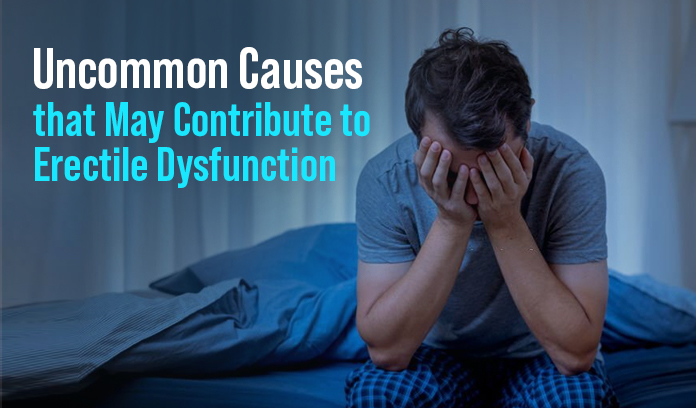While many common causes such as age, psychological factors, physiological factors, and certain medical conditions might be well-known, there are also lesser-known factors that can contribute to erectile dysfunction. In this blog, we will explore some common causes that may contribute to erectile dysfunction and may surprise you. Understanding these issues can help individuals and healthcare professionals address the cause of it effectively and improve overall well-being.
Sleep Disorders:
Sleep disorders, particularly obstructive sleep apnea (OSA), may contribute to erectile dysfunction. OSA can disrupt normal breathing patterns during sleep, leading to intermittent oxygen deprivation and increased levels of inflammation in the body. This inflammation can disrupt blood flow to the genital area, leading to ED. Addressing sleep disorders can enhance the quality of sleep, reduce inflammation, and may reduce the risk of erectile dysfunction.
- Medications: Some medications that are commonly prescribed for other health issues can have an unexpected side effect of causing erectile dysfunction. A few examples include antipsychotics, antidepressants, blood pressure medications, and even some over-the-counter antihistamines. It is essential to speak with your healthcare provider if you experience ED while taking medication to discuss possible alternatives or adjustments.
- Bicycle Riding: Cycling is a great form of exercise, but long hours of bike rides, especially on hard narrow saddles, can cause nerve compression in the perineal region. Because of this compression, some men may experience erectile dysfunction. By using padded seats and taking breaks during long rides, cyclists can reduce this risk.
- Pornography Overuse: Excessive pornography use can be linked to a phenomenon called porn-induced erectile dysfunction (PIED). The brain’s reward system may become desensitized as a result of regular exposure to explicit content, making it more challenging to achieve arousal and erections during real-life sexual encounters. Reducing or abstaining from porn consumption can help recover from PIED and restore healthy sexual functioning.
- Relationship Issues: Intimate relationships play a crucial role in sexual satisfaction. Communication issues, persistent conflicts, and emotional distance from a partner can result in stress and anxiety, contributing to erectile dysfunction. Understanding each other, encouraging open communication, and seeking professional counseling if needed can positively impact sexual health.
Conclusion
A holistic approach to treating erectile dysfunction can lead to overall enhanced well-being and sexual health, whether it involves getting help for sleep disorders, managing medication side effects, or resolving relationship conflicts. Remember, seeking the guidance of a trained healthcare professional is essential for an accurate evaluation and personalized treatment options if you are experiencing persistent erectile dysfunction.

